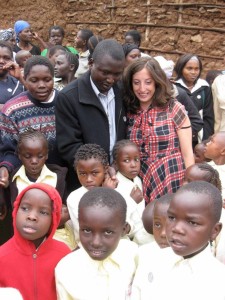
Kennedy Odede and Jessica Posner with children of Kibera
Our partnership with Shining Hope for Communities
We are excited to announce that GET is teaming up with Shining Hope for Communities, which has long combated poverty and gender inequality in the Kibera slum of Nairobi, Kenya, to bring our workshop to the Kibera School for Girls.
About Shining Hope
Founded in 2007 by Kennedy Odede, himself a resident of Kibera, and Jessica Posner, Shining Hope for Communities has built an innovative, groundbreaking global model to combat gender inequality and extreme poverty, two of the world’s most devastating and intractable social ills.
Kennedy writes:
“My father abused my mother, Jane, and kept our family hungry—spending what little money we had on alcohol. Resisting, my mother taught me about gender equality.  Had she been able to go to school, my mother felt she would have been able to feed and care for her family. I saw the potential in the many women like my mother. I saw many people’s lives crushed but despite my own poverty, I was determined to change these devastating realities. I could not sit by as I saw little girls forced to trade their bodies for food. I could not stay silent while I saw such wasted human potential.”
About the Kibera Slum
-
- The Kibera Slum of Nairobi houses 1.5 million people (nearly 50% of Nairobi’s total population) in an area the size of Central Park. It is one of the most densely populated places on the planet.
- Half of all Kiberians are under the age of 15.
- 1 out of 5 children in Kibera do not live to see their fifth birthdays.
- Kibera’s 1.5 million residents share 600 toilets, meaning that on average one toilet serves 1,300 people.
- 66% of girls in Kibera routinely trade sex for food by the age of 16. Many begin as early as age six.
- Young women in Kibera Contract HIV at a rate 5 times that of their male counterparts.
- Only 8% of girls in Kibera ever have the chance to go to school.
- Educating a girl in places like Kibera means she will earn more, invest 90% of her earnings in her family, be 3 times less likely to become HIV positive, and have fewer, healthier children more likely to live past age 5.
About Kibera School for Girls
Educating a girl in places like Kibera means she will earn more and invest 90% of earnings in her family, be three times less likely to contract HIV, and have fewer, healthier children more likely to reach adulthood. However, education for girls is often undervalued in Kibera, and the lack of access to quality health care and resources often prevent students (especially girls) from staying in school. At the Kibera School for Girls, we provide a superior education with free health care, food, and psychosocial services to give our students the support they need to complete their education, and the tools they need to find a path out of poverty for themselves and their families through an innovative curriculum that fosters leadership, critical thinking, and creativity.
We need your support to make this collaboration successful!